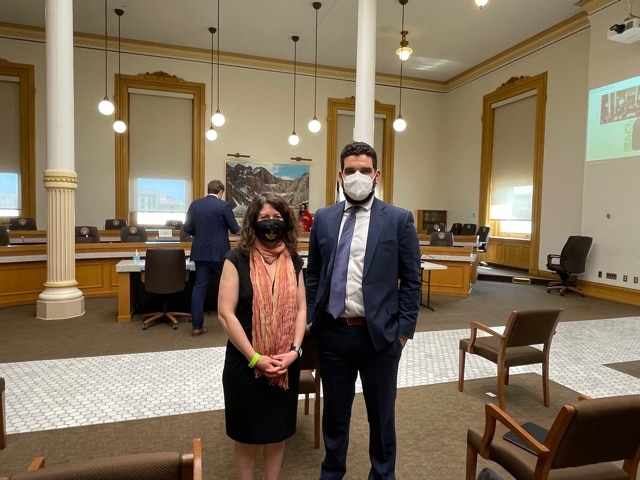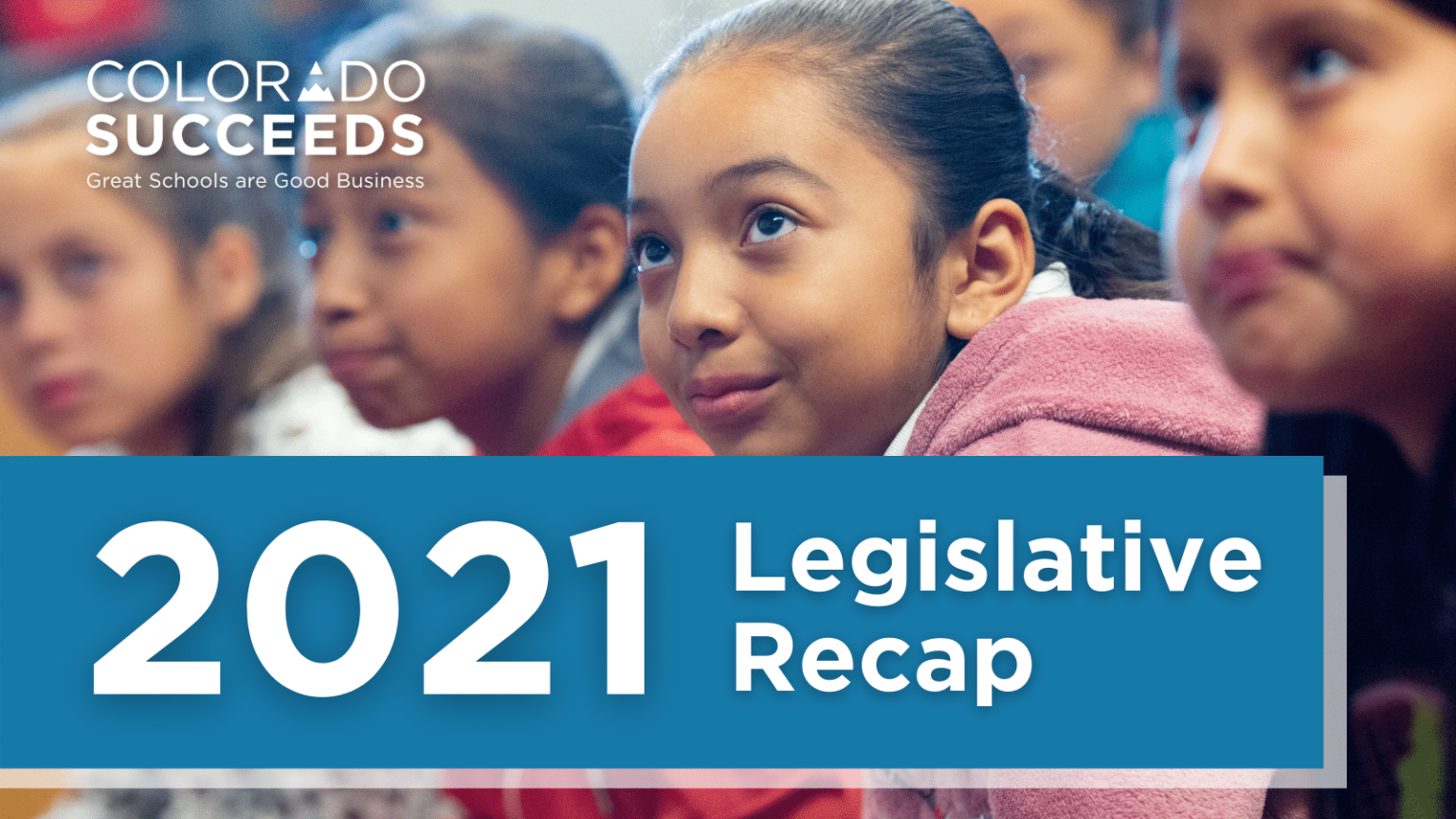Top 10 Policy Wins for Colorado Students in 2021
Colorado Succeeds is thankful for the courageous leadership of legislators, the Governor’s office, state agency leaders, business leaders, educators, students, families, and advocacy partners. Together, we are proud of the results that will benefit Colorado – pre-school through post-secondary.
1. High schoolers are given the flexibility and resources to personalize the 4th year to their post-secondary goals.
Led by Senators James Coleman (D) and Kevin Priola (R), the Successful High School Transitions (SB21-106) will connect high school students—especially those farthest from opportunity— to high-quality career pathways and other postsecondary opportunities in Colorado. This bill 1) creates flexibility around the requirements that students learn within the walls of the traditional classroom, allowing a wider range of career and postsecondary opportunities and 2) makes the fourth year of high school more meaningful. Eligible students who complete high school in three years would receive a public scholarship to take full-time college courses or participate in career training in their fourth year of high school—saving them time and money.

2. Colorado’s youngest learners are prioritized through the creation of a new state agency to implement universal preschool.
Business was a leading voice expressing support for expanding preschool in Colorado and advocating for an advisory group to influence the direction and charge of a new state agency and preschool program. Through HB21-1304, the goal is to alleviate the administrative burden on parents and teachers and to create more innovative and responsive government systems to serve Colorado’s kids, families, and teachers.
With careful consideration and dedication, we can go beyond simply adding another funding stream to an already complex and fractured landscape and instead create a more rational and child-centered system with the new universal preschool program as its foundational element.
Over the next several months, various stakeholders, including business leaders, will draft a transition plan for the state to follow to ensure the correct programs are consolidated and moved to the new department, overburdensome administrative means are streamlined, and the new universal preschool program is developed to ensure true equity and access.

3. High Schoolers will have increased access to high-quality career-connected learning through increased investments in industry credentials aligned to in-demand jobs.
As part of the School Finance Act (SB21-268), the Legislature allocated $1.7 million in additional federal stimulus for the Career Development Incentive Program (CDIP) and an additional $1.7 million for concurrent enrollment. With alarmingly high rates of high school mental health concerns, Colorado Succeeds has advocated for rich opportunities for students to supplement their educational experiences with experiential, career-connected learning to bring relevancy, rigor, and hope for their futures after high school. Investments will be well placed, with Colorado Succeeds-supported legislation passing, Increasing Access to High Quality Credentials (SB21-119), which strengthens the state’s focus in prioritizing in-demand industry-recognized credentials with labor market value.
4. Students experiencing learning loss due to COVID-19 will receive expanded access to high-dosage tutoring and access to high-quality academic recovery coursework.
Colorado Succeeds supported legislation (HB21-1234) led by Rep. Kerry Tipper (D) which provides $5 million towards high-impact tutoring for Colorado students. Succeeds also supported and had a strong role in working on legislation led by Senator Rhonda Fields (D), Ensuring Greater Access to Learning Recovery Coursework this Summer (SB21-013), which will expand course offerings available through the Colorado Digital Learning Solutions(CDLS), the state’s authorized supplemental education program. Each online course is facilitated by a Colorado-certified instructor. It will allow more districts to offer 4–5-week boot camps for those students who have experienced the biggest learning loss over the summer and encourages school districts to partner with nonprofit entities and community-based organizations to expand the availability of, and students’ access to, online learning recovery courses.

5. Families will continue to have the right to pursue a variety of high-quality public-school options with the defeat of legislation designed to remove a charter school’s right to a fair appeal.
Colorado Succeeds strongly opposed HB21-1295, the Rebuttable Presumption In Charter School Appeals, which would have limited the number of charter school options available to students. It would have made it extremely difficult for a charter school to win an appeal where a school district has denied their application. We also advocated for additional funding for Colorado Charter School Institute (CSI) schools through the School Finance Act for a $2 million increase to CSI mill levy equalization funding, bringing the total amount in the equalization fund to $9 million.
6. A compromise is reached that sets the state up for a more balanced evaluation of the state’s accountability system and improvements to better narrow gaps in test scores.
Colorado Succeeds supported the compromise in HB21-1161, which required the state to administer assessments in English language arts to students in grades 3, 5, and 7 and math assessments to students in grades 4, 6, and 8. Colorado must resume identification of schools needing improvement in fall 2022 and ensure transparency of results to the public. Also, Colorado Succeeds sat at the negotiation table throughout legislative session amending Rep. Bird’s bill (HB21-1294) requiring an audit of the accountability system. The original bill focused on how assessments were inherently biased and challenges districts and schools face when compared by academic achievement outcomes. Amendments accepted ensured the audit will be less focused on whether assessments have inherent biases and will be more focused on whether the system helps to reduce academic achievement gaps. The audit will be due in November 2022.
7. State funding for education will be more student-centered with an enhanced at-risk factor and the creation of a new English Language Learner factor.
This year’s School Finance Act (SB21-268), was amended to include two important provisions that moves our school finance system to a more student-centered formula. It adds students eligible for reduced price lunch to those eligible for at-risk and created a new formula factor for English Language Learners. The result is allocating funding to districts in ways that reflect the needs of their students, versus the system. These changes will give districts an extra $118 million next school year and guarantee additional funding going forward.
8. Workers will benefit from influx of federal stimulus funds for reskilling and retraining opportunities.
The state put over $50 million in stimulus funds towards workforce development innovation (HB21-1264), including at least $1.25 million for My Colorado Journey including outreach and recruitment, providing access to digital platforms for career navigating, issuing licenses for virtual training courses, and implementing the program, as well as $17.5 million to the Colorado Workforce Development Council, to enhance the statewide workforce ecosystem, including grants for statewide workforce innovation initiatives.
9. Students will benefit from over $50 million in direct scholarships and other initiatives to complete postsecondary credentials.
Colorado Succeeds advocated for helping students complete credentials, inject more innovation and agility into higher education and HB21-1330 is that starting point. It directs over $50 million in federal stimulus funds to increase postsecondary credential attainment through financial assistance and wrap-around services to support students, allows more institutions to award associate’s degrees in cases where students have earned 70 credits, and allows for more institutions to award degrees often valued by industry- the Bachelor of Applied Science degrees. It also sets up an interim committee to review the role and mission of higher education, which will include K-12 and employer representatives, because of targeted advocacy by Colorado Succeeds.
10. Students will benefit from more opportunities to have their learning validated anywhere it occurs.
Through SB21-106, the number of districts eligible for seat time flexibility through the Innovative Learning Opportunities Program (ILOP) will double, increasing the size of the network up to 40 districts and schools. Further, a new grant program to help students enroll in high quality programming on the 5thday of the Week (HB21-1006) for the state’s 110 districts on a 4-day school week was authorized.
These programs are providing meaningful hands-on experiences that not only parallel students’ learning experiences in the classroom but provide additional life and career skills that are important for future success.
Read more in our 2021 Legislative Recap

